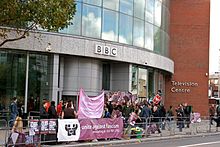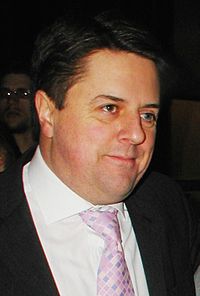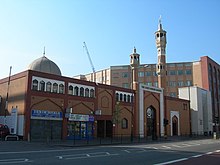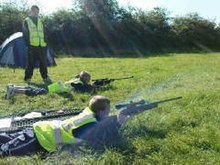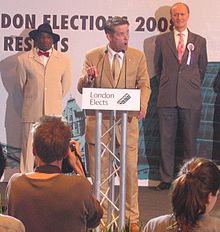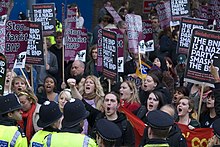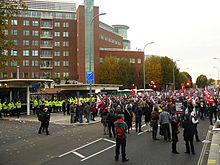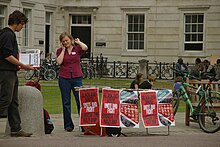British National Party
The new leader Nick Griffin sought to broaden the BNP's electoral base by presenting a more moderate image, targeting concerns about rising immigration rates, and emphasising localised community campaigns.
Operating around a highly centralised structure that gave its chair near total control, the BNP built links with far-right parties across Europe and created various sub-groups, including a record label and trade union.
[26] These marches often involved clashes with anti-fascist protesters and resulted in multiple arrests, helping to cement the BNP's association with political violence and older fascist groups in the public eye.
[29] It suffered from low finances and few personnel,[30] and its leadership was aware that its electoral viability was weakened by the anti-immigration rhetoric of Conservative Party Prime Minister Margaret Thatcher.
[52] The modernisers called the party's first leadership election, and in October 1999 Tyndall was ousted when two-thirds of those voting backed Nick Griffin, who offered an improved administration, financial transparency, and greater support for local branches.
[67] For instance, in Burnley it campaigned for lower speed limits on housing estates and against the closure of a local swimming bath, while in South Birmingham it targeted pensioners' concerns about youth gangs.
[72] In the 2002 local elections the BNP gained four councillors, three of whom were in Burnley,[74] where it had capitalised on white anger surrounding the disproportionately high levels of funding being directed to the Asian-dominated Daneshouse ward.
[106] In June 2013, Griffin visited Syria along with members of Hungarian far-right party Jobbik to meet with government officials, including the Speaker of the Syrian People's Assembly, Mohammad Jihad al-Laham, and the Prime Minister Wael Nader al-Halqi.
[107][108] Griffin claims he was influential in the speaker of Syria's Parliament writing an open letter to British MPs urging them to "turn Great Britain from the warpath" by not intervening in the Syrian conflict.
[12] Instead, it states that the nation only belongs to "the English, Scots, Irish and Welsh along with the limited numbers of peoples of European descent, who have arrived centuries or decades ago and who have fully integrated into our society".
[61] It placed great focus on opposing what it referred to as "multiculturalism",[164] characterising this as a form of "cultural genocide",[163] and stating that it promoted the interests of non-whites at the expense of the white British population.
[201] The BNP's literature is replete with references to a conspiratorial group who have sought to suppress nationalist sentiment among the British population, who have encouraged immigration and mixed-race relationships, and who are promoting the Islamification of the country.
[210] Griffin informed BNP members that rather than "bang on" about the Jews—which would be deemed extremist and prove electorally unpopular—their party should focus on criticising Islam, an issue that would be more resonant among the British public.
[252] There are nevertheless circumstances where it has altered this anti-abortion stance; an article in British Nationalist stated that a white woman bearing the child of a black man should "abort the pregnancy... for the good of society".
[261] Various members of the party presented themselves as "true Christians",[260] and defenders of the faith, with key ideologues stating that the religion has been "betrayed" and "sold out" by mainstream clergy and the British establishment.
[273] Goodwin suggested two possibilities for the BNP's failure to appeal to younger voters: one was the 'life cycle effect', that older people have obtained more during their life and thus have more to lose, feeling both more threatened by change and more socially conservative in their views.
[276] Goodwin suggested that it was the skilled working classes rather than their unskilled or unemployed neighbours who were the main support base behind the BNP, because they owned some assets and thus felt that they had more to lose as a result of the economic threat posed by immigrants and ethnic minorities.
[288] The early stronghold of the BNP was in London, where it established enclaves of support in the boroughs of Enfield, Hackney, Lewisham, Southwark, and Tower Hamlets, with smaller units in Bexley, Camden, Greenwich, Hillingdon, Lambeth and Redbridge.
[291] After Griffin took power, the party focused on building support in the North of England, taking advantage of the anxieties generated by the ethnic riots that took place in Bradford, Oldham and Burnley in 2001.
[292] In a study Goodwin produced with Robert Ford, the two political scientists noted that UKIP's support base mirrored the BNP's in that it had the same "very clear social profile": the "old, male, working class, white and less educated".
[295] This was likely in part because UKIP had a "reputational shield"; it emerged from within the Eurosceptic tradition of British politics rather than from the far-right and thus, while often ridiculed by the mainstream, was regarded as a legitimate democratic actor in a way that the BNP was not.
[301] Griffin tried to build a more professional party machine by educating and training BNP members, providing them with incentives, establishing a steady income stream, and overcoming factionalism and dissent.
[317] The festival brought party activists together and aimed to promote a more family friendly image for the group, although it also provided a venue for white power skinhead bands like Stigger, Nemesis and Warlord.
[329] This information also revealed that membership was most likely in urban areas with low rates of educational attainment and large numbers of economically insecure people employed in manufacturing, with further correlations to nearby Muslim communities.
[340] Instead, he noted that members said that they joined the party as a result of a "profound sense of anxiety over immigration and rising ethno-cultural diversity" in Britain, along with its concomitant impact on "British culture and society".
[380] BNP members were directly responsible for some of this; the party's national organiser Richard Edmonds was sentenced to three months imprisonment for his part in an attack on a black man and his white girlfriend.
[411] The Labour prime minister, Tony Blair, called it a "nasty, extreme organisation",[411] while the Liberal Democrat leader Nick Clegg termed it a "party of thugs and fascists".
[428][429] Individuals whose membership of the party was made public sometimes faced ostracism and the loss of their job: examples include a school headmaster who had to resign, a caretaker who was sacked after attending a BNP rally, and a police officer dismissed from his position.
[440] The BNP initially faced a 'no platform for fascists' policy from the broadcast media, although this eroded as Griffin was invited on to a number of television programmes amid the party's growing electoral success.
[204] In ASLEF v. United Kingdom, the European Court of Human Rights overturned an employment appeal tribunal ruling that awarded BNP member and train driver Jay Lee damages for expulsion from a trade union.


